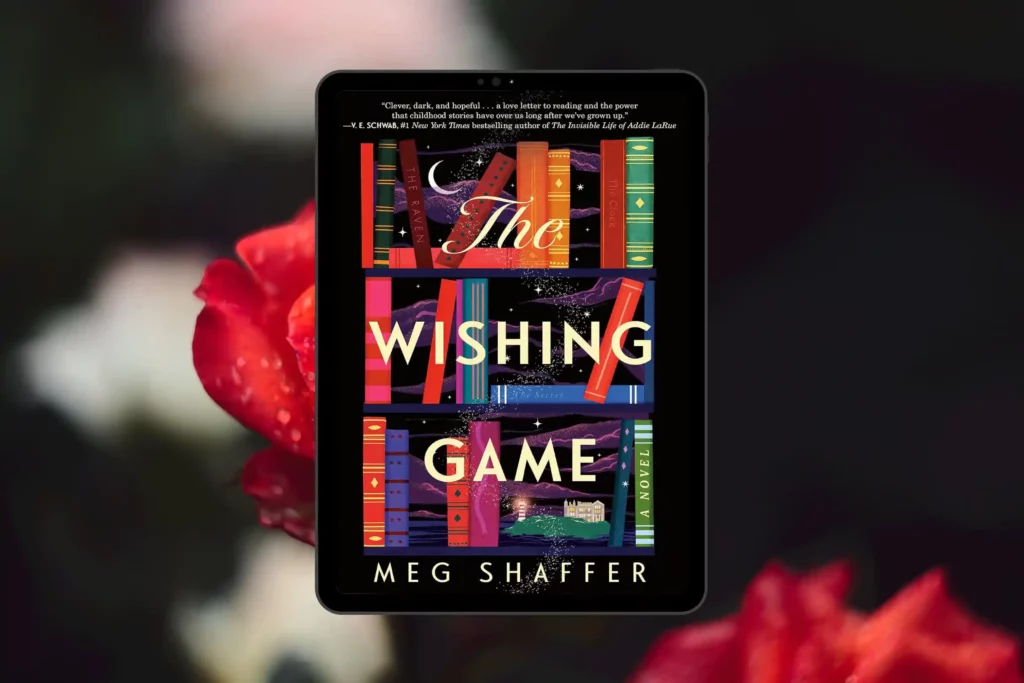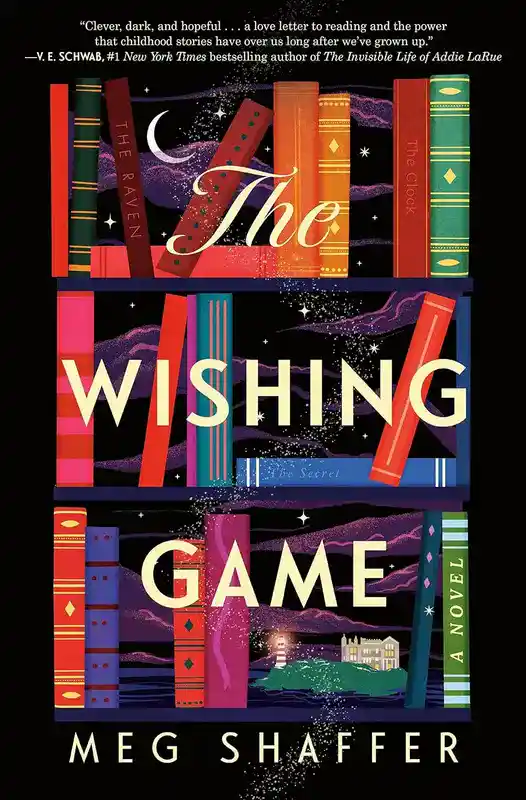This post may contain affiliate links. Read more here.

Note: the following discussion guide contains spoilers, as well as references to critical plot points and the conclusion of The Wishing Game by Meg Shaffer.
The Wishing Game, a novel written by Meg Shaffer in 2023, narrates the uncertain journey of a young woman striving to adopt a boy. Hindered by financial constraints, her only glimmer of hope lies in a whimsical contest orchestrated by the world’s renowned children’s author.
The Wishing Game by Meg Shaffer
The narrative resides at the crossroads of magical realism and romance, exploring themes of found families, the enduring power of stories, and the sacrifices made in pursuit of one’s desires.
Meg Shaffer, a part-time creative writing instructor, marks her debut with The Wishing Game, which quickly rose to charts and became a national bestseller.
In this guide we will go through the complete summary and ending explanation for The Wishing Game by Meg Shaffer.
Have a wonderful book club discussion! ✨
The Wishing Game Summary
On Clock Island, Jack Masterson, a renowned children’s author, resumes writing after a six-year hiatus. Meanwhile, in California, Lucy Hart diligently saves money to adopt Christopher, a child from her school coping with the loss of both parents and residing in foster care. Lucy’s adoption aspirations face grim prospects when a surprising announcement shakes the world – Jack Masterson is back with a new book, and he’s offering the unpublished manuscript to the winner of his contest.
Jack contacts selected contestants with blue letters, revealing a pattern – those who, as children, bravely sought him out over the years, mirroring characters from his novels. Lucy, once such a child, had run away to Clock Island due to her neglectful family. There, she encountered Jack, his pet raven Thurl, and the newly hired illustrator Hugo Reese. Although Jack sent her home, he promised that one day she could be his sidekick.
Fast forward to today, Lucy seizes the chance to participate in the contest, recognizing that victory could secure Christopher’s adoption. She travels to Clock Island, encountering the matured Hugo Reese, just as attractive as she recalls. Other contestants—Andre, Dustin, and Melanie—have already assembled, each grappling with dire situations that winning the manuscript and selling it could alleviate.
Upon Jack’s arrival, he reveals that all contestants will have the opportunity to embody their favorite childhood characters in a contest involving various games, each worth up to two points. The first to accumulate 10 points will win the manuscript. Those unable to meet the contest’s challenges face disqualification.
As Lucy navigates the games, she contends with Dustin’s cheating intentions, lawyer Richard Markham’s selfish aspirations, and her growing affection for the seemingly perpetual frowning but kind-hearted Hugo.
Amidst the challenges, Lucy discovers that Christopher will be moved to a distant foster home by week’s end, prompting her to consider leaving the island despite Jack’s advice to complete the contest. Only Hugo convinces her to stay, revealing the tragic event that led to Jack’s six-year disappearance: a girl named Autumn Hillard, attempting to reach Jack by boat, drowned in her escape from an abusive home.
Encouraged by her friend Theresa, Lucy recommits to winning the contest. When confronted with her deepest fear, she unexpectedly encounters her sister Angie, leading to revelations about their troubled childhood. Angie discloses their parents’ unhealthy focus on her illnesses and their use of her for validation, prompting Lucy to reevaluate her upbringing.
The contest concludes, and on the final day, Jack poses a crucial question. Lucy calls for Christopher, who, overcoming his phone fear, provides the answer she seeks—though too late. No contestant wins, but Jack approaches Lucy, offering her the key to the house and the chance to be his sidekick. Three months later, Lucy and Christopher, now officially mother and son, relocate to Clock Island to reside with Jack and Hugo.
The Wishing Game Ending Explained
So, what happens at the end of The Wishing Game?
The final chapters of The Wishing Game delves deeper into a concept introduced previously – the distinction between immediate desires and long-term necessities. This idea surfaces when Hugo prevents Lucy from risking the stormy voyage to Portland, emphasizing that while Christopher may want her presence now, he truly needs her enduring support.
The author highlights this concept into the final plot twists, where none of the contestants emerges victorious in the contest, failing to secure the coveted manuscript despite completing all the assigned games and challenges.
Jack, intuitively understanding that a windfall of money won’t resolve all issues for his surrogate children, exemplifies this notion. For instance, Andre could potentially address his father’s medical bills with the winnings, but what he genuinely needs is to find a kidney donor. Similarly, while Melanie could temporarily avert the closure of her bookstore by selling the manuscript, her real need lies in fostering recurring sales and consistent foot traffic, achievable through an exclusive book launch.
The narrative subtly underscores the idea that material gains, in this case, the manuscript, may not be the ultimate solution to the characters’ deeper, underlying needs. It prompts reflection on the characters’ true necessities and the importance of understanding the distinction between momentary desires and the enduring fulfillment of genuine needs.
Lucy’s situation intricately intertwines with the needs of Hugo and Jack. While a substantial sum of money could expedite the adoption process, Lucy acknowledges its transience, as highlighted in Chapter 13: “Six figures… One hundred thousand dollars—or maybe more? With that money, Lucy could easily afford an apartment and a car and take care of Christopher [but] [i]t wouldn’t last long in California” (124).
Money might ease the journey, yet Lucy’s genuine requirement goes beyond mere financial means; she craves a family and a robust support system, echoing Mrs. Costa’s sentiments in Chapter 3: “I know you’ve heard it takes a village to raise a child. Where’s your village? Where’s your support system?” (37).
Similarly, Hugo grapples with the need for a compelling reason to remain on the island, tied to the only father figure he has ever known. Simultaneously, Jack harbors the desire to fulfill his own yearning for fatherhood and family. Jack, perceptive of all three needs, orchestrates a convergence, a realization Hugo begins to fathom while awaiting Lucy and Christopher at the airport: “This whole bloody game was a ploy to try and trick me into staying?” (268).
The significance of Jack offering the Clock Island house to Lucy cannot be overstated. For Jack, Clock Island is not merely an inspirational muse for his art; the house encapsulates his vulnerabilities and multifaceted identity.
Symbolically, Jack presents Lucy with the key to his heart, atop the literary representation of his life’s achievements (his first book). While Lucy could have rejected this gesture and refused to acknowledge Jack as a surrogate father, such a decision would have denied her everything she truly needs and has longed for since discovering Jack’s books as a child.
Overall, the novel orchestrates a resolution that harmonizes all three wishes and needs, culminating in a loving found family, as Jack steers his found family toward successful lives and the fulfillment of their aspirations.
How did you like the ending of the novel? Happy reading! ❤️
